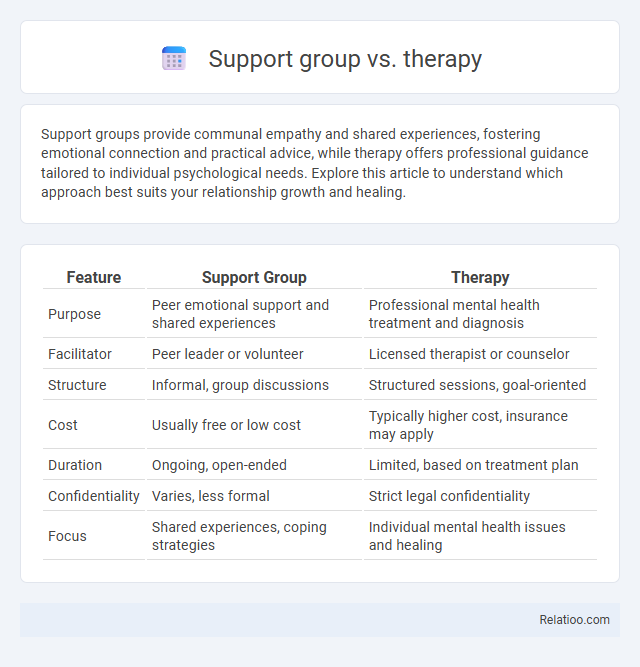Support groups provide communal empathy and shared experiences, fostering emotional connection and practical advice, while therapy offers professional guidance tailored to individual psychological needs. Explore this article to understand which approach best suits your relationship growth and healing.
Table of Comparison
| Feature | Support Group | Therapy |
|---|---|---|
| Purpose | Peer emotional support and shared experiences | Professional mental health treatment and diagnosis |
| Facilitator | Peer leader or volunteer | Licensed therapist or counselor |
| Structure | Informal, group discussions | Structured sessions, goal-oriented |
| Cost | Usually free or low cost | Typically higher cost, insurance may apply |
| Duration | Ongoing, open-ended | Limited, based on treatment plan |
| Confidentiality | Varies, less formal | Strict legal confidentiality |
| Focus | Shared experiences, coping strategies | Individual mental health issues and healing |
Understanding Support Groups vs. Therapy
Support groups provide peer-led emotional support and shared experiences, fostering a sense of community among members facing similar challenges. Therapy involves structured, professional treatment guided by licensed therapists to address mental health issues through personalized interventions. Understanding the difference between support groups and therapy is crucial for choosing the right approach based on individual needs and goals.
Key Differences Between Support Groups and Therapy
Support groups provide a shared space where individuals can connect with others facing similar challenges, fostering peer support and mutual encouragement without professional intervention. Therapy involves a licensed mental health professional guiding personalized treatment plans aimed at diagnosing and addressing psychological issues on a deeper level. Understanding these distinctions helps you choose the appropriate setting for healing, especially when coping with abuse, ensuring the right balance of empathy and expert care for recovery.
Benefits of Joining a Support Group
Joining a support group provides a safe space for you to share experiences and gain emotional support from individuals facing similar challenges, fostering a sense of community and understanding. Unlike therapy, which is led by a licensed professional focusing on individualized treatment, support groups emphasize peer connection and empowerment without the costs of professional sessions. For those recovering from abuse, support groups offer validation and collective healing, helping members rebuild trust and resilience through shared insights and encouragement.
Advantages of Individual and Group Therapy
Individual therapy offers tailored treatment plans addressing specific mental health issues with personalized attention from a therapist, facilitating deeper self-awareness and emotional healing. Group therapy provides a supportive environment where participants share experiences, reduce feelings of isolation, and build social skills, promoting collective growth and empathy. Both formats effectively complement abuse recovery by combining personal insight with connectedness, enhancing resilience and coping strategies.
Who Can Benefit Most from Support Groups?
Support groups are ideal for individuals seeking shared experiences and community understanding, especially those coping with abuse or trauma, offering a safe space for emotional validation and peer encouragement. Therapy, led by licensed professionals, is best suited for You if you need personalized treatment plans and deeper psychological intervention to address complex mental health issues. While abuse survivors benefit immensely from support groups to reduce isolation, therapy provides critical tools for healing and recovery through targeted therapeutic techniques.
Who Should Consider Therapy Instead?
Therapy is ideal for individuals dealing with deeper emotional trauma, unresolved abuse, or complex mental health issues requiring professional intervention and personalized treatment plans. Support groups offer peer connection and shared experiences but lack the individualized focus and clinical expertise found in therapy. Your mental health professional can help determine if therapy is the most effective option for addressing your specific needs, especially when abuse has significantly impacted your well-being.
Costs and Accessibility: Support Group vs. Therapy
Support groups typically offer low-cost or free access, making them highly accessible for individuals seeking community-based support. Therapy usually involves higher expenses due to personalized, professional treatment but provides tailored interventions for abuse recovery. Your choice depends on budget constraints and the level of specialized care needed.
How to Choose Between Support Groups and Therapy
Choosing between support groups and therapy depends on the severity and nature of abuse experiences, as therapy offers individualized treatment plans led by licensed professionals specializing in trauma recovery. Support groups provide peer-driven environments where survivors share experiences and coping strategies, promoting communal healing and reducing isolation. Evaluating personal needs, comfort with group settings, and access to professional mental health services guides the decision-making process for effective recovery after abuse.
Integrating Support Groups with Therapy
Integrating support groups with therapy enhances recovery by combining peer empathy with professional guidance, addressing the complex dynamics of abuse more effectively. Support groups provide shared experiences and emotional validation, while therapy offers personalized interventions and coping strategies tailored to individual trauma. This dual approach maximizes healing potential, fostering resilience and long-term emotional well-being.
Finding the Right Support for Your Mental Health
Support groups offer a communal space where members share experiences and encouragement, fostering a sense of belonging and mutual understanding. Therapy provides individualized professional guidance tailored to your unique mental health needs, focusing on diagnosis, treatment, and coping strategies. Understanding the difference between support groups and therapy is crucial for identifying the best resources to address abuse and facilitate healing on your journey to mental wellness.

Infographic: Support group vs therapy
 relatioo.com
relatioo.com